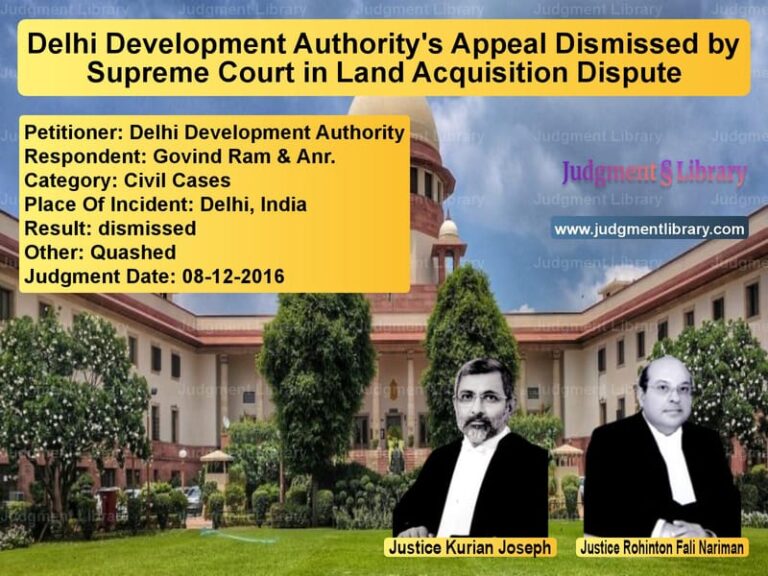Arbitration Award and Specific Performance: Supreme Court Rules on Land Dispute
The case of Firm Rajasthan Udyog & Others vs. Hindustan Engineering & Industries Ltd. revolved around the legal enforceability of an arbitration award in a land dispute. The Supreme Court examined whether an arbitration award, which determined the compensation amount for land, could be executed as a suit for specific performance of an agreement, even when the reference to the arbitrator was only for price fixation. The Court ultimately ruled that execution beyond the arbitration award was impermissible.
Background of the Case
The dispute arose over a piece of land measuring approximately 145 bighas (around 60 acres) in Rajasthan. The land originally belonged to Firm Rajasthan Udyog, which had acquired it in 1966. The State of Rajasthan issued a notification in 1973 under the Rajasthan Land Acquisition Act, 1953, to acquire the land for Hindustan Engineering & Industries Ltd. (HEIL). The landowners challenged the acquisition, leading to prolonged litigation.
After multiple legal proceedings, including rulings by the Rajasthan High Court and the Supreme Court, the acquisition was quashed in 1976. However, an agreement was reached between the parties in 1978, facilitated by the Chief Minister of Rajasthan, where the landowners agreed to sell part of their land to HEIL at a price to be determined through arbitration.
Key Legal Issues
- Was the arbitration award limited to price fixation, or did it create an enforceable right for land transfer?
- Could the execution court order the execution of a sale deed based on an arbitration award that only determined price?
- Did the withdrawal of a specific performance suit impact the execution proceedings?
Petitioner’s Arguments (Firm Rajasthan Udyog & Others)
- The firm argued that the arbitration award was limited to determining the price of the land and did not create a binding contract for sale.
- They contended that the execution of a sale deed could not be ordered since the agreement of 1980 had been unconditionally withdrawn by HEIL in 2006.
- They emphasized that the arbitration award did not direct them to execute the sale deed and that the execution court exceeded its jurisdiction by enforcing such a direction.
- The petitioners also pointed out that neither the agreement nor the award was registered, making their enforcement legally questionable.
Respondent’s Arguments (Hindustan Engineering & Industries Ltd.)
- HEIL argued that the arbitration award effectively finalized the land sale agreement and that the execution court was justified in enforcing it.
- The company claimed that the landowners were bound by their commitment and could not later challenge the execution of the sale deed.
- They contended that the withdrawal of the specific performance suit did not affect their right to enforce the award.
- HEIL also argued that the execution court had broad powers to interpret and enforce the arbitration award.
Supreme Court’s Observations
The Supreme Court made several important observations in its ruling:
- The arbitration award explicitly stated that its purpose was to determine the compensation amount and did not create a binding contract for sale.
- The withdrawal of the specific performance suit by HEIL in 2006 indicated that they had abandoned their claim for enforcing the land sale.
- The execution court exceeded its jurisdiction by directing the execution of a sale deed when the award itself did not provide for it.
- Since the arbitration award was only declaratory, fixing the price of the land, it could not be treated as a decree for sale execution.
The Court stated, “An arbitration award that only determines the price of land cannot be executed as a specific performance decree. The agreement for sale had to be enforced through separate legal proceedings, not through execution of the award.”
Final Judgment
The Supreme Court allowed the appeal and ruled:
- The execution proceedings were invalid as they went beyond the scope of the arbitration award.
- The direction to execute the sale deed was quashed.
- As compensation for litigation costs, the petitioners were ordered to pay Rs. 60 lakhs to the respondents.
Implications of the Judgment
This ruling has significant implications for arbitration and contract law:
- Arbitration awards must be enforced strictly as per their terms, without expanding their scope.
- Execution courts cannot assume powers beyond what is granted in the award.
- Withdrawal of specific performance suits limits further claims for enforcement.
- Proper legal procedures must be followed for enforcing land sale agreements.
The judgment reinforces the principle that execution courts cannot exceed the mandate of arbitration awards and ensures that legal procedures are properly followed for contract enforcement.
Petitioner Name: Firm Rajasthan Udyog & Others.Respondent Name: Hindustan Engineering & Industries Ltd..Judgment By: Justice Uday Umesh Lalit, Justice Vineet Saran.Place Of Incident: Rajasthan.Judgment Date: 24-04-2020.
Don’t miss out on the full details! Download the complete judgment in PDF format below and gain valuable insights instantly!
Download Judgment: Firm Rajasthan Udyog vs Hindustan Engineerin Supreme Court of India Judgment Dated 24-04-2020.pdf
Direct Downlaod Judgment: Direct downlaod this Judgment
See all petitions in Arbitration Awards
See all petitions in Contract Disputes
See all petitions in Enforcement of Awards
See all petitions in Judgment by Uday Umesh Lalit
See all petitions in Judgment by Vineet Saran
See all petitions in allowed
See all petitions in Quashed
See all petitions in supreme court of India judgments April 2020
See all petitions in 2020 judgments
See all posts in Arbitration and Alternate Dispute Resolution Category
See all allowed petitions in Arbitration and Alternate Dispute Resolution Category
See all Dismissed petitions in Arbitration and Alternate Dispute Resolution Category
See all partially allowed petitions in Arbitration and Alternate Dispute Resolution Category







